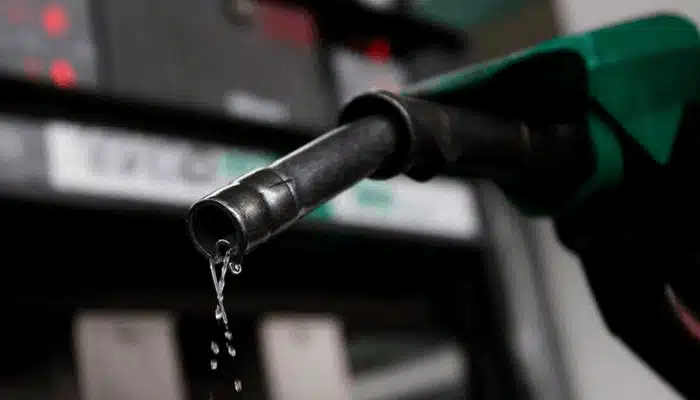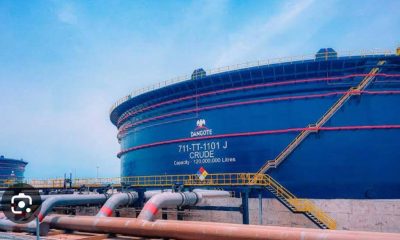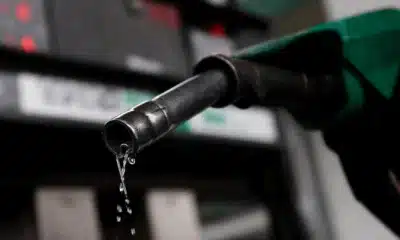Nigeria News
Oil Marketers Assure Nigerians Of Imminent Petrol Price Drop

Oil marketers have assured Nigerians of a significant reduction in the price of Premium Motor Spirit (PMS), commonly known as petrol, with expectations that the pump price will drastically decrease in the near future.
This development is attributed to the Federal Government‘s continued implementation of the crude and refined product sales in naira initiative.
Marketers revealed that the move would alleviate the pressure on fuel prices, with additional support expected from Dangote Refinery, which is anticipated to lower its petrol loading costs by the end of the week. This is expected to contribute further to the reduction of petrol prices across the country.
The National Publicity Secretary of the Independent Petroleum Marketers Association of Nigeria (IPMAN), Chinedu Ukadike in an interview with Punch, reassured the public about the forthcoming price drop.
He emphasized that the decision by the Federal Executive Council (FEC) to implement the naira-for-crude agreement would ease the strain on fuel prices.
Ukadike expressed confidence that the continuation of the initiative, which involves the sale of crude oil and refined products in naira rather than US dollars, would stabilize fuel prices. He commended the government’s direction, adding that the initiative would reduce the demand for foreign currency in the petroleum sector, contributing to long-term price stability.
The National Publicity Secretary of the Crude Oil Refinery-owners Association of Nigeria (CORAN), Eche Idoko, also weighed in on the issue, stressing the need for greater involvement of local refiners in the Naira-for-Crude agreement.
Idoko pointed out that expanding participation in the initiative would enhance its economic benefits and strengthen the overall impact on the country’s fuel market.
He argued that a broader base of local refiners could help reduce Nigeria’s dependence on imported refined products, further bolstering the economy and improving price stability.
Ukadike, speaking during the interview, said, “We have always mentioned that the deal was definitely going to be implemented. We don’t know the details of the new agreement. IPMAN welcomes the latest development and it shows Mr. President has listening ears with this kind of output from the government. It shows that inputs from individuals and stakeholders matter a lot. The policy doesn’t deter anyone who wants to import petroleum products. But the most important thing is that they should go ahead and ensure that the conclusion affects prices in the market.
“With this new decision taken by the government, I also believe earnestly that just with the complaint of marketers crying of huge losses caused by a sudden drop in price. Their plea is also yielding fruit.”
He added that with the positive development and recent fall in the price of crude, the 650,000 is poised to reduce its loading price downward before the end of the current week.
Ukadike added, “I believe that from now till the end of the week, the Dangote refinery will come up with a new price. They can’t complain of having old stock because that is not the best practice internationally.”
On his part, CORAN national official Eche Idoko welcomed the news that the policy would be permanent but urged the government to ensure its full implementation, particularly in its inclusion of all local refineries.
Idoko described it as one of the most effective strategies of the current administration to stabilise the local economy amid recent global economic challenges.
He said, “CORAN welcomes the idea of the new information on the continuation of the naira for crude policy as we have always maintained it is one of the most potent policy of this administration in trying to stabilise the local economy and in the event of recent happenings in the global economy. It has become more expedient to pursue this policy as it seems to protect the emerging refining industry in Nigeria.”
However, CORAN pointed out that the pilot phase of the policy, which was initially extended only to Dangote refinery, fell short in certain areas. The group noted that the total allocation earmarked for the naira-for-crude initiative was not fully implemented during the pilot phase, which raised concerns.
“We hope that in this new phase, the remaining five refineries that are refining in Nigeria would be included, and more importantly, this crude would be made readily available for them, so that we can maximise the advantage that comes with refining locally, especially when everyone is moving towards self-dependence and self-sufficiency in production,” Idoko added.










